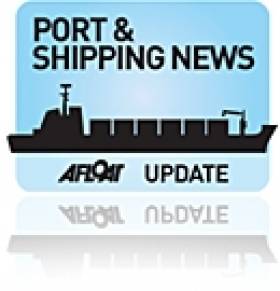Displaying items by tag: Global economy
Ship Starring in BBC ‘The Box’ Departs Dublin Port
#PORTS & SHIPPING- Vega Stockholm, a vessel which featured in the BBC The 'Box' that tracked the movements of a single container around the world in 2008, coinciding with the start of the credit crunch crisis and telling the story of globalisation and the world economy, departed Dublin Port this evening, writes Jehan Ashmore.
The Box travelled the world ( totalling 50,000 miles) first departed from the BBC TV Centre headquarters, London and headed northwards by road to Scotland. From there the Box was loaded on board the Vega Stockholm in Greenock and she departed on 12th September (see PHOTO) and made an en route call to Belfast before arriving the next day in Dublin Port. Only 16 days later the fateful decision by the Irish Government to bail-out the Irish banks was made with a state guarantee.
The domestic economic crisis was also set against some of the most dramatic developments in the global economy including the first global recession in 60 years, notably with the fall of global finances giant Lehman Brothers.
The container box or forty equivalent units or (FEU) in industry parlance was painted in distinctive red and emblazoned with the words BBC News and the website www.bbc.co.uk/thebox so it could be tracked online across continents and oceans in addition to coverage by T.V. and radio. To trace the route taken by Box over 421 days to and from the UK, click HERE. In addition for further photographs taken by viewers following the Box departing the Clyde on board the container vessel click HERE.
On the first leg of a worldwide journey, Vega Stockholm (2006/8,306grt) departed the Scottish port with the Box laden with 15,000 bottles of Scotch whiskey bound for Shanghai, though this particular 'feeder' vessel would of carried the box to another port prior to onward shipment to the Far East by a much larger containership.
The Box carried other cargoes on different legs as part of its worldwide journey to include 4000 shoes and over 95,000 tins of cat food for our fluffy friends. Of the entire journey, over 47,000 miles was spent crossing the oceans.
The box itself suffered some battering along the way including that of an economic front as the container sat still for three months in the docks of the Japanese port of Yukohoma.
At the time a record 10% of the fleet were idle, and revenues per container were likely to have dropped from already extremely depressed levels. The journey of the Box made for an interesting time to be following a container around the world.
To put some figures into context during the exercise the global container business made a collective profit of £3bn in 2008, but is estimated to have lost a cool £20bn in 2009.
After the Box arrived back to Southampton with vehicle parts, the container finally returned to London. Perhaps the most ironic tale of the exercise was the actual fate of the 'Box' itself, as it was reported the container ended up in South Africa to be converted for use as soup kitchen, another story for the Beeb!
- Ports and Shipping
- Dublin Port
- BBC The Box
- Vega Stockholm
- Containerships
- Global economy
- Lehman Brothers
- Irish bank bailout
- Irish state bank guarantee
- BBC headquarters
- Port of Greenock
- Container feeder services
- Port of Shanghai
- Scotch Whiskey
- Yukohoma
- Credit crunch crisis
- Southampton Docks
- BBC News
- Clyde
- Port of Belfast
























































